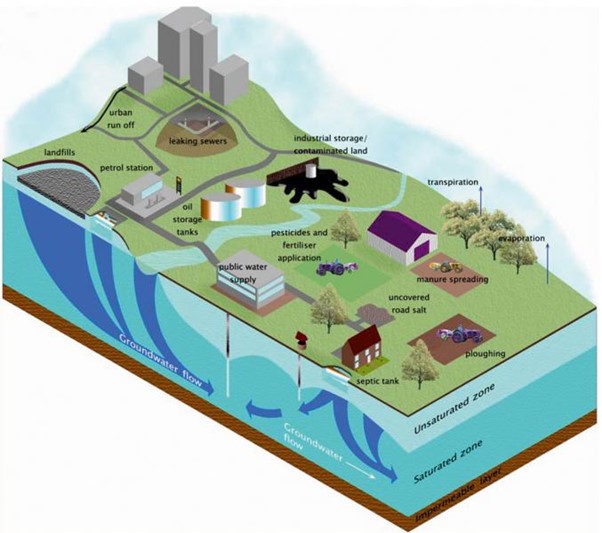Hydrogeology
Dr R Chow
Course Overview
This module will lay the foundations for students interested in a career in the water sciences. The focus of the module is on hydrogeology and the module will cover both theoretical concepts and practical applications. The course will outline the basic concepts involved in the hydrological cycle, and the way that this cycle differs in different parts of the planet, from the atmosphere to the pedosphere to the lithosphere. The concept of Darcy's Law will be explained and how we can use it to understand the movement of water in the earth. Definitions of important concepts such as hydraulic conductivity, porosity and permeability are provided and explained as well as more complex concepts such as transmissivity and storativity. Thereafter, the differences between aquifers, aquitards and aquicludes will be discussed and their relationship to the saturated vs unsaturated zones and the water table explained. These concepts will also be explained in terms of how we can identify different types of aquifers using different geophysical techniques and other types of aquifer tests. Steady state flow and non-steady state flow will be examined as well as recharge and discharge processes and how we might identify these zones using geological concepts. The hydrochemical character of groundwater will be examined, in particular the use of isotope hydrology to understand differences between different groundwater systems and how isotopes can be used to look at the interaction of different groundwaters and to calculate the residence age of groundwater. Groundwater modelling will be outlined and will bring together many of the concepts previously presented as a way of examining groundwater resource evaluation and management. Finally, the South African Water Act of 1998 and its bearing on groundwater management will be discussed. The module will use a range of case studies, both local and international, to show applications of the concepts presented.

Credit: UK Groundwater Forum, Public Domain
Course Objectives
After completion of the module students should be able to:
- Explain the concept of the hydrological cycle.
- Understand the characteristics of and difference between, an aquifer, aquitard and aquiclude and how these influence the movement of groundwater.
- Understand the movement of groundwater through the earth's crust and differentiate between the saturated and unsaturated zones.
- Use Darcy's Law to to solve 1- and 2- dimensional flow problems.
- Understand the geochemical composition of groundwater, how this varies depending on host rocks and how it evolves along different flow paths.
- Use isotopes to trace patterns of groundwater flow and interaction.
- Understand the role of the National Water Act in managing groundwater resources in South Africa.
Practical Classes
Practicals are held every week of the semester. Some practicals may extend over more than one week. All practical exercises must be handed in by the due date.
Textbooks and recommended reading materials
There are three excellent textbooks that are available. These are:
- Freeze, R.A. and Cherry, J.A., 1979. Groundwater. [available online as now out of print]
- Domenico and Schwartz, 1997. Physical and Chemical Hydrogeology. 2nd Edition, Wiley Scientific Publishers.
- Clarke, I. and Fritz, P, 1997. Environmental Isotopes in Hydrogeology. CRC Press, Taylor and Francis Group.
Whilst it is recommended that access to one of more of these references will greatly benefit students in this module, the module is not reliant on these textbooks.

